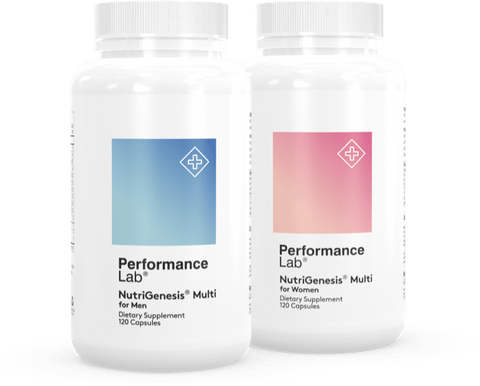You've probably heard little about magnesium since the days of high-school chemistry, but in the last few years, magnesium has made a boom in the health and wellness world.
Magnesium has been recommended for athletes dealing with muscle cramps and those struggling with sleep—but there’s more where that came from.
Got a headache? Try magnesium. Feeling anxious? Magnesium will do the trick. Mood swings? Pop back some magnesium. There seems to be no end to what magnesium is recommended for, but what’s the big deal with it?
With nearly 50% of the U.S. adult population consuming less than the recommended daily intake, low magnesium has connections to several chronic diseases, including type 2 diabetes, metabolic syndrome, hypertension, osteoporosis, migraines, and more 1.
So, if you’re not keen on seeing what happens when your magnesium levels fall, this article is for you.
We’re covering the basics of magnesium—what it is and why you need it—and giving you our top three products to ensure your intake is up to par.
What is Magnesium?
Magnesium is the fourth most abundant cation and the second most abundant intracellular cation 2. It’s essential for numerous physiological functions that extend its role as a powerful electrolyte and muscle relaxation.
Yet, although it’s widely available in food sources, most of the population doesn’t consume enough.
The majority of magnesium is found within the bone, muscle, and non-muscular soft tissues, and much like calcium in bone provides a reservoir of calcium when intake is insufficient, magnesium does the same—roughly 50-60% of magnesium is on the surface of the bone as a component of hydroxyapatite.
However, magnesium stored this way isn’t as bioavailable to increase serum concentrations when intake is insufficient.
While you may know magnesium as one of the best muscle relaxants or in your favorite sports drink post-workout, magnesium plays a much more significant role.
It’s required as a cofactor for more than 300 enzymatic reactions that play critical roles in optimal physiological functions. Magnesium helps stabilize enzymes, many of which are involved in producing the high-energy substrate adenosine triphosphate, or ATP for short 2.
ATP is required to power virtually every biological process in the body, ranging from glucose metabolism to muscle contraction. So, the body can’t produce ATP or perform without sufficient magnesium.
Here’s a more complete picture of everything magnesium is involved in:
It’s involved in:
- Mitochondrial biogenesis (formation)
- Glucose utilization
- Fat, protein, and nucleic acid synthesis
- Coenzyme production
- Muscle contraction (including heart rhythm)
- Neurological function
- Neurotransmitter release
- Vascular tone
- Bone integrity
Did you know magnesium had such a significant role? That’s why hitting the requirements daily is so important. Let’s dive into some of the benefits of magnesium.
Benefits Of Taking Magnesium
1. Blood Pressure
Whether you’re pre-hypertensive, hypertensive, or trying to get your blood pressure under wraps to avoid getting into hypertension territory, magnesium is an excellent supplement to add to your pill roster.
Magnesium is listed as one of the most effective natural supplements for reducing blood pressure because of its ability to relax blood vessels and increase blood flow.
Intakes ranging from 500mg to 1000 mg/day have been shown to reduce systolic and diastolic blood pressure by as much as 5.6 mmHg and 2.8 mmHg, respectively 3. But lower doses of just 350 mg effectively reduce blood pressure 4.
The other way magnesium may benefit blood pressure is through its effect on nitric oxide production. Nitric oxide is one of the most potent signaling molecules that can modulate blood vessel dilation, which helps to improve blood flow and reduce arterial pressure 5.
2. Muscle Function
If you’ve experienced muscle tension or soreness after a particularly stressful week or hard work, you’ve probably been told to take some magnesium—and that’s because of magnesium’s role in muscle function.
Magnesium and calcium are the primary regulators of muscle contraction; calcium enters muscles to stimulate fibers to contract, while magnesium counteracts the effects of calcium to help muscles relax 1, 6.
On top of that, the sodium-potassium pump that generates electrical impulses requires magnesium to function, and with insufficient magnesium, heartbeat and muscle contraction can become irregular 7.
Like in the heart, magnesium functions as a natural calcium blocker in muscles to induce relaxation. Calcium enters muscle cells and binds to specific proteins—troponin C and myosin—to alter the shape of the proteins and generate a contraction 8.
However, magnesium competitively binds to these sites to inhibit contraction and allow them to relax. If magnesium levels are low, too much calcium enters your muscles and results in cramping and spasms.
If your body doesn’t have enough magnesium to compete with calcium, your muscles may contract too much, causing cramps or spasms 9.
3. Blood Sugar Regulation
As we mentioned briefly, one of the manifestations of low magnesium is an increased risk of type 2 diabetes.
Low magnesium levels can exacerbate the problem for people who struggle with blood sugar regulation because magnesium helps regulate insulin and moves sugar from the bloodstream to cells for storage 10.
All insulin receptors require magnesium to function properly. If levels are too low, cells cannot effectively use insulin, leaving glucose in the bloodstream and elevated blood sugar levels 11, 12.
Because of its role in supporting proper insulin function, research has linked high-magnesium diets to a reduced risk of type 2 diabetes. But it’s not just diabetics that it helps—one study found that magnesium supplementation improved insulin sensitivity in non-diabetic people 13.
4. Sleep
Whether you have a monkey mind when it’s time to turn out the lights, or you’re someone who wakes up mid-sleep and can’t get back to bed, there’s a good chance you could benefit from magnesium. Several studies have shown a positive link between sufficient magnesium levels and sleep quality.
Magnesium’s role in muscle relaxation may improve sleep onset latency and sleep quality and improve symptoms of insomnia 14, 15. What’s more, magnesium also regulates melatonin production; melatonin is the hormone that governs the body’s sleep-wake cycle 16, 17.
And what’s more, it can even bind to gamma-aminobutyric (GABA) receptors in the brain, which helps to calm down nerve activity and facilitate sleep 18, 19.
How Much Magnesium Do You Need?
It’s clear that magnesium plays a vital role in several aspects of physiological function, but how much is required to stay out of the red zone?
The recommended daily intake for magnesium for adults 19 years and older sits at 400-420 mg daily for men and 310-320 mg for women.
However, certain circumstances can increase intake requirements, such as pregnancy, gastrointestinal problems, and more.
Magnesium Deficiency Symptoms
If you think you may be magnesium deficient, watch out for these signs and symptoms:
- Neuromuscular irritability
- Cardiac arrhythmias
- Muscle twitches and tremors
- Mood changes
- Weak bones
- Fatigue and muscle weakness
- High blood pressure
Where To Find Magnesium
When it comes to getting enough magnesium, there are two options: diet and supplements. Through diet, there are plenty of options, but some of the best vegan magnesium-rich food sources include:
- Dark chocolate
- Cashews
- Almonds
- Brazil nuts
- Avocados
- Lentils
- Chickpeas
- Tofu
- Flaxseeds
- Pumpkin seeds
- Chia seeds
- Buckwheat
- Quinoa
- Bananas
- Leafy greens (kale, spinach, collards, turnip greens, mustard greens)
On the other hand, if you want the convince of covering your magnesium intake in one go without having to number crunch, here are the top places to find it:

Performance Lab Sleep: If you struggle to get through the night without waking up, Performance Lab Sleep will do the trick. It’s designed to give you the best night’s sleep of your life without the nasty groggy side effects of conventional sleep aids or synthetic melatonin.
Featuring natural melatonin from CherryPURE Montmorency cherries and three forms of magnesium, it relaxes the body and mind to help you drift off to la-la land—and stay there until it’s time to wake.

Performance Lab Energy: If fatigue has been hitting you lately, it could be time to top up your magnesium stores. Because of its role in ATP production and mitochondrial biogenesis, magnesium and energy go hand in hand—and Performance Lab Energy supplies all the magnesium necessary to boost the power of your mitochondria and get those energy levels rocking.
Featuring modern ingredients like MicroActive® Q10, BioPerine®, BioPQQ®, and Bio-Enhanced® nutrition technology, Energy optimizes cells’ mitochondria for a surge of natural vitality in both body and mind.

Performance Lab NutriGenesis Multi: We’d love to think that all the nutrients we need can come through diet, but it’s unrealistic. And while a supplement isn’t designed to replace a balanced diet, NutriGenesis Multi works to top up nutrients that may be missing from the diet.
Explicitly catered to men’s and women’s needs, Multi uses vitamins and minerals complexed with natural cofactors to enhance absorption and bioactivities. If you’re looking for peak physical and mental performance, this one is a must.
References
- Rosanoff A, Weaver CM, Rude RK. Suboptimal magnesium status in the United States: are the health consequences underestimated?. Nutr Rev. 2012;70(3):153-164.
- Jahnen-Dechent W, Ketteler M. Magnesium basics.Clin Kidney J. 2012;5(Suppl 1):i3-i14.
- Houston M. The role of magnesium in hypertension and cardiovascular disease. J Clin Hypertens (Greenwich). 2011;13(11):843-847.
- Zhang X, Li Y, Del Gobbo LC, et al. Effects of Magnesium Supplementation on Blood Pressure: A Meta-Analysis of Randomized Double-Blind Placebo-Controlled Trials. Hypertension. 2016;68(2):324-333.
- Borghi C, Cicero AF. Nutraceuticals with a clinically detectable blood pressure-lowering effect: a review of available randomized clinical trials and their meta-analyses. Br J Clin Pharmacol. 2017;83(1):163-171.
- Iseri LT, French JH. Magnesium: nature’s physiologic calcium blocker. Am Heart J. 1984;108(1):188-193.
- Apell HJ, Hitzler T, Schreiber G. Modulation of the Na,K-ATPase by Magnesium Ions. Biochemistry. 2017;56(7):1005-1016.
- Potter JD, Robertson SP, Johnson JD. Magnesium and the regulation of muscle contraction. Fed Proc. 1981;40(12):2653-2656.
- Bilbey DL, Prabhakaran VM. Muscle cramps and magnesium deficiency: case reports. Can Fam Physician. 1996;42:1348-1351.
- Barbagallo M, Dominguez LJ. Magnesium and type 2 diabetes. World J Diabetes. 2015;6(10):1152-1157.
- Reis MA, Reyes FG, Saad MJ, Velloso LA. Magnesium deficiency modulates the insulin signaling pathway in liver but not muscle of rats. J Nutr. 2000;130(2):133-138.
- Suárez A, Pulido N, Casla A, Casanova B, Arrieta FJ, Rovira A. Impaired tyrosine-kinase activity of muscle insulin receptors from hypomagnesaemic rats. Diabetologia. 1995;38(11):1262-1270.
- Guerrero-Romero F, Tamez-Perez HE, González-González G, et al. Oral magnesium supplementation improves insulin sensitivity in non-diabetic subjects with insulin resistance. A double-blind placebo-controlled randomized trial. Diabetes Metab. 2004;30(3):253-258.
- Wienecke E, Nolden C. Langzeit-HRV-Analyse zeigt Stressreduktion durch Magnesiumzufuhr (Long-term HRV analysis shows stress reduction by magnesium intake).MMW Fortschr Med. 2016;158(Suppl 6):12-16.
- Abbasi B, Kimiagar M, Sadeghniiat K, Shirazi MM, Hedayati M, Rashidkhani B. The effect of magnesium supplementation on primary insomnia in elderly: A double-blind placebo-controlled clinical trial. J Res Med Sci. 2012;17(12):1161-1169.
- Meng X, Li Y, Li S, et al. Dietary Sources and Bioactivities of Melatonin. Nutrients. 2017;9(4):367.
- Peuhkuri K, Sihvola N, Korpela R. Dietary factors and fluctuating levels of melatonin. Food Nutr Res. 2012;56:10.3402/fnr.v56i0.17252.
- Poleszak E. Benzodiazepine/GABA(A) receptors are involved in magnesium-induced anxiolytic-like behavior in mice. Pharmacol Rep. 2008;60(4):483-489.
- Gottesmann C. GABA mechanisms and sleep. Neuroscience. 2002;111(2):231-239.












